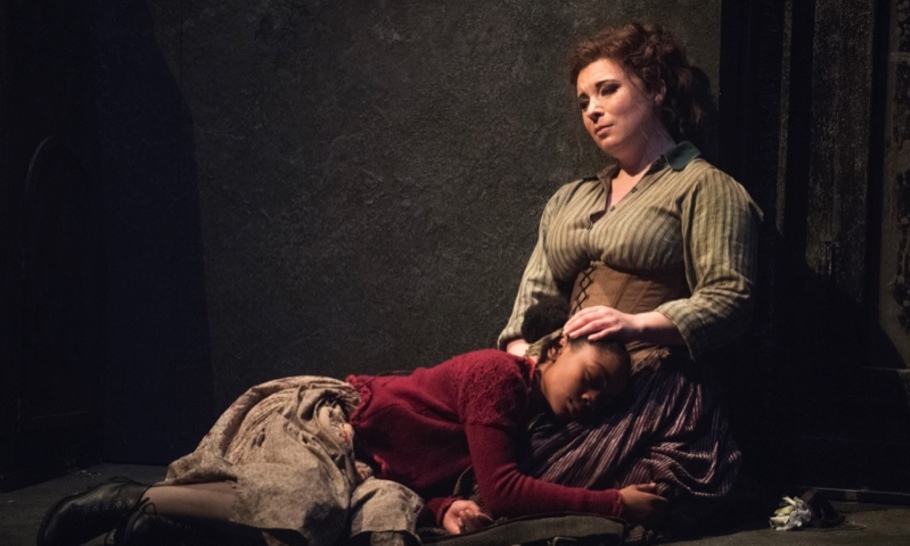Jack the Ripper at English National Opera: victims given centre stage

Photo by Alastair Muir
The key to this Jack the Ripper drama lies in its subtitle, The Women of Whitechapel. This is not about the serial murderer, but the world of the women he preyed on. They are represented by five principals along with the dark presence of Maud (a harsh Josephine Barstow), presumed mother of Mary, who has taught her own daughter, Magpie, to read. At the end, after Mary too has died and reappeared in white standing in her coffin, Magpie (a silent role) returns to the stage to open the small door at the base of a lamp-post and retrieve her book, Theseus and the Minotaur.
Everything here is pregnant with meaning, and lit by lamps – for it is never daylight on stage. This is a demi-world with its share of nasty characters who deal brutally with those of a more open, generous disposition, such as the barrow boy Squibby (Alex Otterburn), who brings bloody off-cuts of meat from the knackers yard and hopes Mary will one day return his love. He is kicked to death. Or the young writer (William Morgan), keen to save Magpie from her grandmother Maud, who intends to sell her into a life of prostitution. She accuses him of trying to purchase the virgin Magpie, and the corrupt police who deal in drugs through the wicked old Maud take him away. This is not a pretty world, and when Polly sings, “I feel pretty tonight” it is the prelude to her death at the hands of the killer.
She is the first to go, but not the last. Before that death we hear a wonderful quintet, and Iain Bell’s fluent music is always atmospheric, if lacking in stark contrasts. The singing was excellent with Janis Kelly powerful as a colourful Polly, Marie McLaughlin a lyrical Annie, Susan Bullock and Lesley Garrett terrific as happy trollops (their term) Liz and Catherine, and Natalya Romaniw simply superb as Mary Kelly. Fine vocal support too from Alan Opie as the pathologist, with Robert Hayward as Police Commissioner, and Nicky Spence as a strongly sympathetic Police Sergeant, along with the chorus, observing everything.
Musically, though, this is a dark work, and I found myself wishing for a lighter ‘Beggar’s Opera’ tone at times. Costumes are authentic, and the staging gives a sense of the dim half-light on an evening in Victorian London. This is the world of poverty, contrasted with the better-off milieu of the professional world, where the presence of men in black coats and top hats lends a leering, intrusive prurience to events. Emma Jenkins’ libretto has its lighter moments but this is an earnest work that never quite escapes the feel of a documentary, well grounded in facts as the composer tells us in the programme notes. With the death of Mary Kelly at the end, and a choral refrain of ‘none but the lonely heart shall know my sorrow’, Maud sings of a day of wrath. The sense of a requiem and its dies irae pervades the auditorium.
Solemn, but scarcely operatic.
Continues until 12 April — details here.





